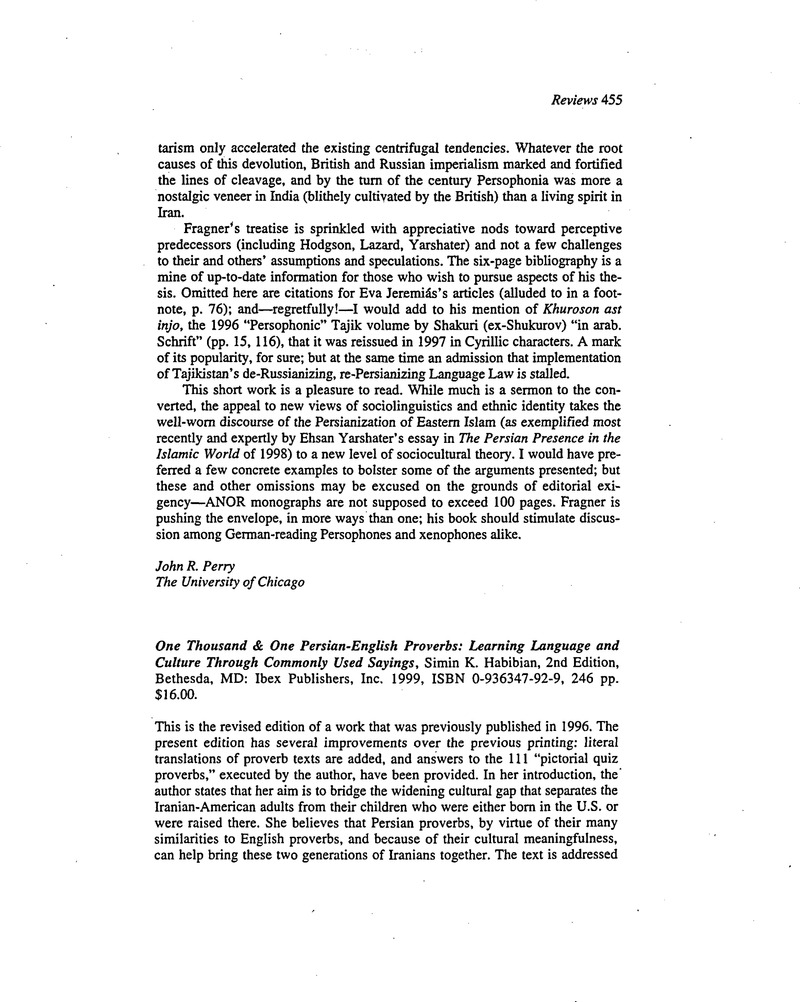No CrossRef data available.
Article contents
One Thousand & One Persian-English Proverbs: Learning Language and Culture Through Commonly Used Sayings, Simin K. Habibian, 2nd Edition, Bethesda, MD: Ibex Publishers, Inc. 1999, ISBN 0–936347–92–9, 246 pp. $16.00.
Published online by Cambridge University Press: 01 January 2022
Abstract

- Type
- Reviews
- Information
- Copyright
- Copyright © Association For Iranian Studies, Inc 2000
References
1. Green, Thomas A., ed., Folklore: an Encyclopedia of Beliefs, Customs, Tales, Music, and Art 2 vols. (Santa Barbara, California: ABC-CLIO, 1997), 2: 662Google Scholar.
2. Mieder correctly asks: “How was Karl Friedrich Wilhelm Wander … to include contextual materials with his 250,000 German proverbs in his massive, 5-volume Deutsche Sprichwörter-Lexikon?” (Green, Folklore 2: 663.)
3. See for example the collection of African-American proverbs by Anand Prahland, Sw., African-American Proverbs in Context (Jackson, Mississippi: University Press of Mississippi, 1996)Google Scholar, and his discussion in chapters 1 and 4.
4. Bahar, Hadi, Badan-i insān dar am![]() āl-i Fārsī: barguzīdahī az żarb al-masal-hā, andarz-hā, iṣtilāḥāt ᶜāmyānah, tashbīhāt va tarkībāt. (Bethesda, MD: H. Bahar, 1991)Google Scholar. Bahar, Hadi, Dilnāmah-i Bahār: “dil” dar am
āl-i Fārsī: barguzīdahī az żarb al-masal-hā, andarz-hā, iṣtilāḥāt ᶜāmyānah, tashbīhāt va tarkībāt. (Bethesda, MD: H. Bahar, 1991)Google Scholar. Bahar, Hadi, Dilnāmah-i Bahār: “dil” dar am![]() l, andarz-hā-yi hakīmānah, iṣṭilāhāt-i ᶜāmyānah, tarkībāt va tashbīhāt-i Fārsī va kārburd-i ānhā dar shiᶜr va adab-i kuhan va mucᶜṣir-i Īrān (Rockville, MD: International Travelers’ Clinic, 1997)Google Scholar.
l, andarz-hā-yi hakīmānah, iṣṭilāhāt-i ᶜāmyānah, tarkībāt va tashbīhāt-i Fārsī va kārburd-i ānhā dar shiᶜr va adab-i kuhan va mucᶜṣir-i Īrān (Rockville, MD: International Travelers’ Clinic, 1997)Google Scholar.
5. It is true that the material for Dihkhuda's collection of proverbs was taken out of his lexicon, however, since it is in his Am![]() āl o ḥikam that proverbs are arranged alphabetically, neglecting this source is befuddling to the present author.
āl o ḥikam that proverbs are arranged alphabetically, neglecting this source is befuddling to the present author.




